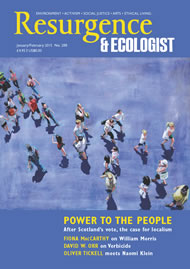January 2013 – the start of the now infamous horsemeat scandal – was a shaky month to be a meat eater. And although it’s only a coincidence that Farmageddon was completed in tandem with that blow to status quo in the meat industry, it couldn’t have been more timely. As public trust in the supply chain collapsed alongside an eruption of anger towards supermarkets, here came a book showing us how these shocking revelations were near-inevitable, not to mention how close we are to even bigger disasters than having horse in your cow.
It is not – self-admittedly – a book that advocates vegetarianism or necessarily demonises corporations. Nor is it an appraisal of the politics of food akin to Raj Patel’s Stuffed and Starved, although it is similar in its global scope. It’s an assessment of agriculture in a globalised world, sliding further and further into intensification since the hungry aftermath of the second world war, propped up by policies that prioritise quantity over quality (and over safety, security and suffering, for that matter).
For a book focused on anguish and declining ecosystems, it’s quite a breezy read. Especially in its front half, Farmageddon is just as much a travel document as it is a piece of polemic or investigative journalism. Philip Lymbery is as excited about getting a ride in a rickety plane as he is disgusted by the farms he’s observing beneath him; as thrilled to be in the former home of Rachel Carson as he is dismayed by the monoculture of the landscape that surrounds it.
The earnestness of his writing is charming. In an age where it’s increasingly in vogue to make the arguments against meat from a firmly anthropocentric point of view, it’s refreshing to find someone who speaks up for fish and bees purely on the grounds of welfare, following decades of confronting animal mistreatment. But the snag with Lymbery’s arguments from experience is that they aren’t always well enough written to be emotionally persuasive. Say what you want about the postmodernist fireworks of something like Jonathan Safran Foer’s Eating Animals, but at least he goes at it with both hands. Lymbery writes things like: “The birds cried with woe. I hated it.”
When Lymbery argues with his head rather than his heart, he’s on firmer ground. Thankfully, this is what makes up the substance of the book across its back half, undressing the arguments for factory farming to find self-serving illogic, and putting the case that “sustainable intensification” is a chimerical delusion. Some argue that there isn’t enough space to rear animals in free-range conditions. Lymbery retorts that all the UK’s chickens could be raised outdoors in a space a third of the size of the Isle of Wight. Some argue that we need to farm more intensively in order to feed 7 billion people. Lymbery replies that diverting soya, fish and grain to feed animals reared for meat results in a net loss of food, rather than a gain.
His solutions are elegant and deceptively mild: raise animals outside, rotate crops properly, and feed people instead of factory-farmed animals. And, of course, for you and me: eat less meat, and buy locally. These are well-rehearsed pieces of advice, familiar to pretty much everyone nowadays, but often filed away with the same set of ‘shoulds’ as ‘I should start jogging’ and ‘I should stop smoking.’ Can any combination of evidence and rhetoric talk people off today’s cheap meat?
A year after the horsemeat scandal, we saw a reported 3% drop in beef sales across the UK (hitting stuff like ready meals and frozen burgers the hardest) and encouraging increases in the use of local butchers and meat substitutes. But this is still pretty small beer. The likelihood of the global public cutting down on meat to any impactful degree, whether through compassion or from ick factor, still remains vanishingly remote. Farmageddon is a robust indictment of today’s path to agricultural self-destruction, and it succeeds in arguing across several perspectives at once, from ecological to economic. The question is whether it is persuasive enough, or whether any book can be. We will see whether its arguments are heeded before its title gets its full gravitas.






